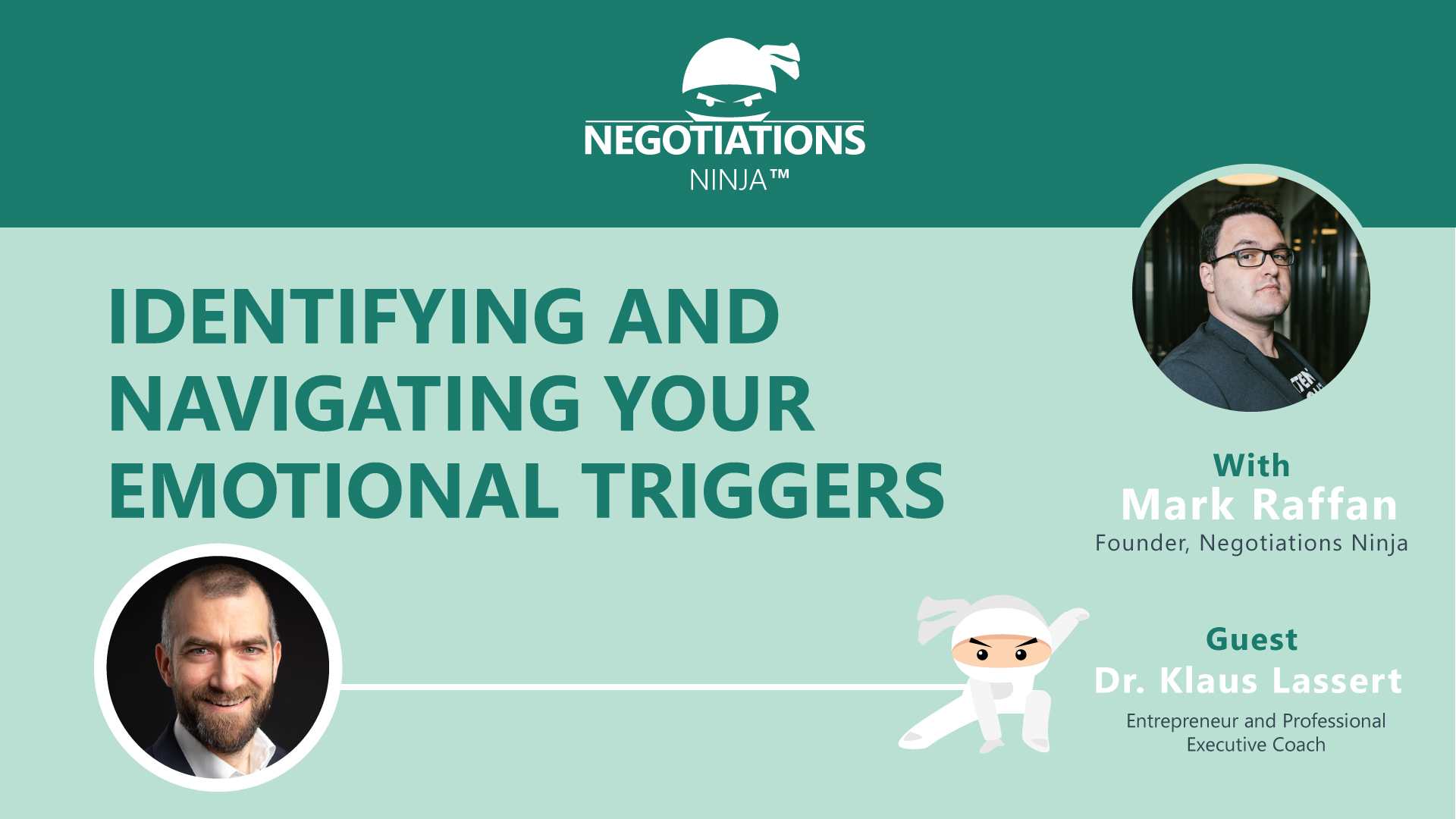What are the emotional triggers that you struggle with in a negotiation? How will they influence your negotiations? How do you keep your emotional triggers from derailing your performance? For over 15 years, Dr. Klaus Lassert has leveraged psychology to help professionals overcome what’s holding them back to successfully navigate tough negotiations. In this episode of Negotiations Ninja, he’ll help you think through identifying and navigating your emotional triggers. Check it out!
Outline of This Episode
- [1:57] Learn more about Dr. Klaus Lassert
- [3:20] How to identify your emotional triggers
- [8:20] How to overcome your emotional triggers
- [11:10] Using a counterparty’s triggers to your benefit
- [15:01] How your personality type influences you
- [25:52] Using your personality type to your advantage
The role of emotional triggers in negotiation
One of the worst things that can happen in a negotiation is accidentally triggering a response from the other side that you don’t understand. Yet one of the best things you can do is consciously trigger a response from the other side. Overall, Dr. Lassert notes that you benefit more from pressing “green” buttons but can play around with the “red” ones. However, your first duty is to observe your emotional triggers and maintain that no one messes with your mind.
Secondly, good negotiators prepare for their negotiations. Inevitably, things don’t always go according to plan. The perception that you’re off-plan might trigger the wrong perception that you’ve lost the negotiation. The other side didn’t have to do anything for you to trigger yourself into believing you can’t negotiate!
How to identify your emotional triggers
So how do you determine what your triggers are? Start by having conversations in your mind. As you think through your negotiations, you’ll pinpoint the things that might trigger you when you have an emotional reaction. What’s happening in your emotions? What is your thought process?
The biggest danger for an experienced negotiator is to drop the tactics they planned because emotion kicks in. It might lead to berating the counterparty. Most people have a strong reaction when they perceive they’re being treated with a lack of respect. You don’t have to be vain to feel that. It leads to anger.
How to overcome your emotional triggers
Dr. Lassert points out that roleplaying can help you learn to recognize and overcome your emotional triggers. Why? Because once you recognize your trigger, you’ll realize that you will be triggered. So you get to practice what you’ll do when you’re triggered in place of your normal instinctual reaction.
The right action can be something simple. Maybe you count to five and read out your next demand. Or you ask your next question. It’s something you can easily do under pressure. You don’t need to appear smart, entertaining, or spontaneous—you just need a good deal.
If someone throws a ball at you, pick it up, say “thank you,” set it to the side, and throw the ball you’re prepared to throw.
How to use a counterparty’s triggers to your benefit
I have a friend who triggers the counterparty emotionally to move them off their plan and gain a psychological advantage. When a proposal was made, he would say, “What the F*ck is this? We want to do business with you, and you come to me with this? This is third-grade dog food. Why are we doing this?”
When you hear something like that, most people are immediately triggered and become angry. This allows my friend to control the conversation. His goal is to force the counterparty to react and “fix things.” The counterparty feels like they have to explain why what they proposed is smart. They have to convince him. Overly agreeable negotiators usually react by apologizing and trying to fix the situation.
If you were the counterparty, how should you deal with that? Do not react. If you don’t react, what will that person think? What will they say next? It doesn’t matter. You know that the attack is likely a tactic. You don’t need to do all the talking. If the counterparty repeats his attack, he’ll eventually get bored. You have to hold your ground and maintain patience.
How does your personality type influence how you react and respond? How does it impact your overall negotiation? Listen to the whole episode to learn more!
Connect with Dr. Klaus Lassert
- Connect on LinkedIn
- Schranner Negotiation Institute
Connect With Mark
- Follow Negotiations Ninja on Twitter: @NegotiationPod
- Connect with Mark on LinkedIn
- Follow Negotiations Ninja on LinkedIn
- Connect on Instagram: @NegotiationPod




